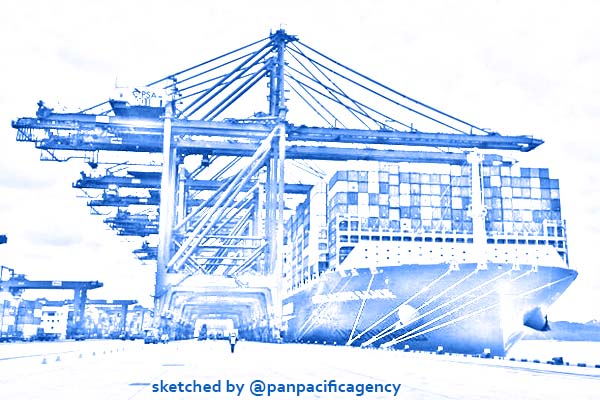World’s largest LNG-powered container ship calls at Singapore as maritime industry tackles climate change

The CMA CGM Jacques Saade, the world’s largest container ship powered by liquefied natural gas, in Singapore on Oct 12, 2020. ST PHOTO: CHONG JUN LIANG. Sketched by the Pan Pacific Agency.
SINGAPORE, Oct 12, 2020, ST. The largest container ship in the world powered by liquefied natural gas (LNG) docked in Singapore on Sunday (Oct 11), before loading up and heading onwards to Europe the next day, The Straits Times reported.
At 400m long, the CMA CGM Jacques Saade, belonging to French shipping and logistics firm CMA CGM, is longer than four football fields, and is 78m tall and 61m wide.
Its voyage takes place despite challenges and disruptions caused by the pandemic, and embodies the resilience of the maritime industry and its efforts to address climate change, said Senior Minister of State for Transport and Foreign Affairs Chee Hong Tat on Monday (Oct 12).
“Not only is shipping keeping global supply chains open and goods flowing, new ships that also address other critical challenges are being put into operation,” said Mr Chee, who viewed the ship at Pasir Panjang Terminal.
He noted that the use of LNG can contribute towards meeting the International Maritime Organisation’s goal of reducing greenhouse gas emissions from global shipping by 2050 and phasing them out within this century.
“The pathways to achieving these goals will require strong cooperation among stakeholders, as well as significant investments. It cannot be achieved by any single party working alone, but requires a collective effort by all stakeholders working together,” he said.
In his speech, Mr Chee also reaffirmed Singapore’s commitment, as a major transshipment port and bunkering hub, to supporting global efforts to fight climate change, such as in finding “innovative ways to provide for the future green fuel needs of the shipping industry”.
The CMA CGM Jacques Saade megaship has a capacity of 23,000 20ft equivalent units (TEUs), and is operated by a 26-man crew, along with one gas management officer.
The ship was constructed after seven years of research and development, and harnesses digital technology such as augmented reality screens on the bridge of the ship to enhance situational awareness.
The vessel started its maiden voyage from China on Sept 23, and passed through various ports before reaching Singapore on Sunday.
Later on Monday, it will depart for North Europe and the Mediterranean, with containers of household goods, electronics, machinery and personal protective equipment.
The vessel will call at 13 ports in all over 84 days, including Busan in South Korea, Shanghai in China, Klang in Malaysia, Rotterdam in the Netherlands, Dunkirk in France and Southampton in the UK.
Mr Stephane Courquin, head of CMA CGM in Asia and Oceania, said that LNG is the most advanced solution when it comes to preserving air quality today, and called it a “critical part of our energy transition strategy”.
Compared with traditional marine fuel oil, LNG reduces sulphur and fine particles emission by 99 per cent, nitrogen dioxide emissions by 85 per cent and carbon dioxide emissions by up to 20 per cent, he explained.
Mr Courquin also announced that in the coming months, CMA CGM will have eight other similarly large ships joining its fleet. By 2022, it will have 20 LNG-powered vessels.
“As we move ahead with LNG, we are hopeful that there will be a wider adoption of LNG in the industry. This also means that the global LMG infrastructure must mature with supply sources in more parts of the world, so that it will be operationally viable for carriers,” he said.
Singapore has been developing the infrastructure to support the use of LNG, and the Maritime and Port Authority of Singapore has issued two LNG bunker supplier licences, with more to come in the coming weeks.